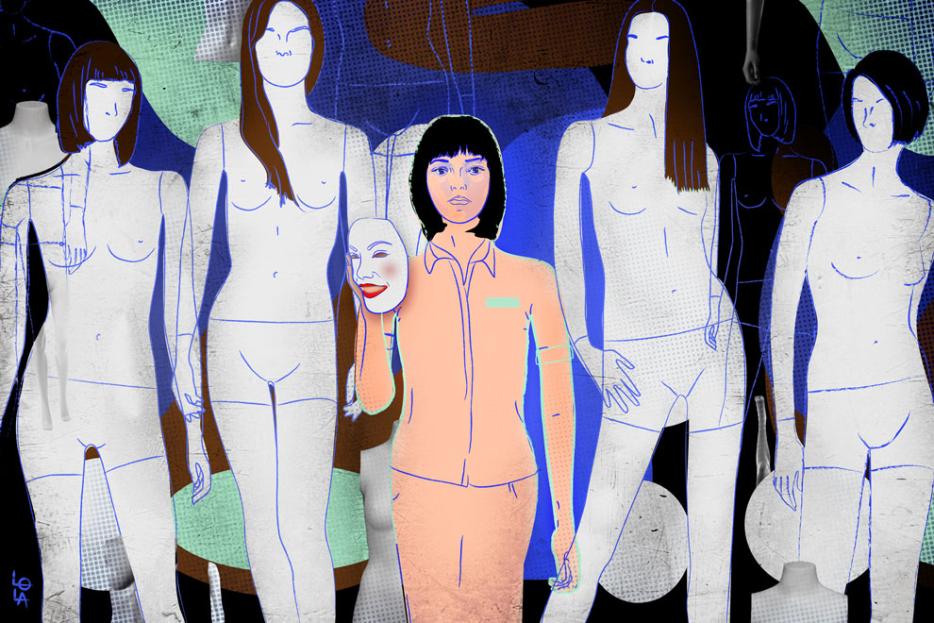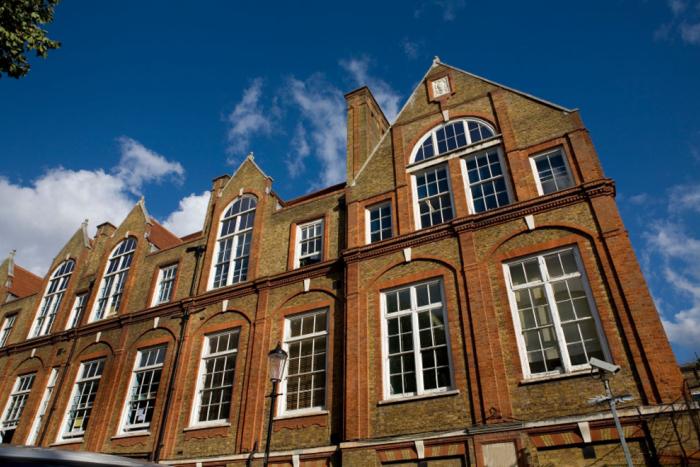At the beginning of Jean Rhys’s Good Morning, Midnight, the protagonist, Sasha Jansen, is in a certain bar listening to a certain song when she begins to cry. A fellow patron chastises her: “Sometimes I’m just as unhappy as you are. But that’s not to say I let everyone see it.”
Sasha may be in the process of drinking herself to death. Following a suicide attempt, she seeks refuge in Paris, hoping to escape thoughts of her failed marriage, her dead child, a string of ill-fated relationships and terminated jobs. She does not succeed. Her life, as she says, is a “complicated affair of cafes where they like me and cafes where they don’t, streets that are friendly, streets that aren’t, rooms where I might be happy, rooms where I never shall be, looking-glasses I look nice in, looking-glasses I don’t, dresses that will be lucky, dresses that won’t, and so on.” And Sasha, crucially, works in retail.
Retail is a profession dominated by the young and the female, and Sasha is the patron saint of the shop girl who never thinks the customer is right. She knows that the compulsion to buy yourself better is a lie, but she can’t stop falling for the redemptive power of a certain dress. And she knows that her job is to act as a blank slate for customers to project their ideals of beauty and femininity, which means her hilarious, incisive, and often desperately sad feelings bubble just below the surface. I worked in retail for nine years, and I found it simultaneously boring, enraging, enlightening, painful, hilarious, and demeaning—but none of my customers would ever have known that. I was drawn to Jean Rhys because of how well she speaks to that duality. “Of course, you must make your mind vacant, neutral,” Sasha says, “then your face also becomes vacant, neutral–you are invisible.”
Kate Zambreno cares about the plight of the shopgirl. Her 2011 novel, Green Girl, features Ruth, an American living in London and working at a prestigious department store she calls Horrid’s. It’s a companion to Good Morning, Midnight: Ruth shares with Sasha a preoccupation with and fear of being watched, an obsession with consumption and novelty, and a never-ending battle against unwelcome thoughts and memories.
Zambreno’s most recent book, Heroines, examines the lives of the so-called “mad wives” of modernism, including Jean Rhys herself. In the book, Zambreno describes Rhys as “the patron saint of girls, then women like me, who have always been so mute, cast aside, their subjectivity surrendered in the big novels…girls who are charming diversions until they grow old or one grows bored with them. And Jean Rhys writes back, the prose intoxicated, fragmented, elliptical, with snatches of song and dialogue…The kept women speaks back!”
I was lucky enough to speak with Kate about the experience of being the shopgirl and the shop patron, our conflicted feelings about the nature of consumption, and our mutual love for Jean Rhys.
Green Girl is based on your experience, but you never worked in a department store, right?
I didn’t! I was in London unemployed for a couple of months, and my partner’s student loans hadn’t kicked in, so I was desperate for work. Eventually I got hired as a “temporary,” which is this whole concept in London, the “temp,” at Foyles Bookshop.
A lot of Green Girl is inspired by working in the bookshop. But also the month I started working on Green Girl, when I got back from London, I worked at Club Monaco for holiday retail. I was really terrible at it. I think folding clothes is really terrifying. There was this level of cheeriness. Like in book retail you don’t have to be as “on,” you know? You don’t have to smile so much.
And you found your first Jean Rhys book when you worked at Foyles.
I did! What I loved about that bookstore was that everyone was super well-read and really passionate about books. This one guy, this emo British guy who was totally into The Smiths, was like “Oh, you have to read Jean Rhys.” I remember him saying Jean Rhys is amazing for reading when you’re on the dole. I had never read anything like it. It was so direct and so, so sad. So depressing, but wonderfully depressing. Ecstatically depressing. Good Morning, Midnight is my favorite. I probably read it once a year. It’s such a gorgeous, rhythmic, stirring, hate-filled book.
I feel like I was very lucky that I found it when I did—I was 18 and in this journalism program, and the mandatory English elective was Modern and Post-Modern Literature. I was so grateful that I’d had a teacher who made us read that.
I think I feel for Jean Rhys what some girl poets feel for Sylvia Plath. I mean, I love Sylvia Plath, but I do think Jean Rhys is the patron saint of high emotions for me. I feel like I’m very jealous of your 18-year-old self. I cannot image reading Jean Rhys at that age, and I wonder—this is silly, but if I had read a work like hers, would something have changed? I didn’t read many women writers! Even all through college.
Jean Rhys really speaks to so many girls in our culture who are pretty much mute, who don’t have the words to describe their experience. I mean, how many novels from the point of view of shop girls are there? Or bitter ex-shop girls? There’s really not that many. I think she’s just this really crucial, gorgeous, important voice. Novels of sadness that are big in our culture are not written from the point of the view of 30-year-old ex-shop girls. It’s just a very rare point of view. There are books ABOUT shop girls.
What I loved so much, especially because I was at an age where I had no idea how to express anger in any sort of healthy way, was that Sasha was so angry.
So angry.
She has these imaginary conversations with her boss and her customers and I felt like she’s so righteous in this anger. For me she was this female role model who could be angry and funny and just nail these assholes, even if it’s only in her mind.
I don’t know if for me she was a role model—there’s something about Sasha Jansen that’s very not empowering. But Jean Rhys does, as an author, give a voice to that theory. Like in that [part] where the patriarchal pig fires her and Sasha has that really acidic bitter internal monologue. We realize that it’s the girl on the outside who is always thought of as mute, and she is mute in that scene, but we get to see the fury. I think she’s refuting what we hear about retail and what we hear about being a girl. She’s refusing to be happy, she’s refusing to be quiet, she’s this older woman crying in public. She refuses to behave. She’s a troublemaker. But I mean, her characters are extremely passive and extremely mute, and I would say they have pretty violent or silenced ends. She did not write happy endings.
No.
But I agree with you, it’s the anger, the raw anger. It is very freeing.
It’s not a romantic view at all, of course, of working retail. She really strips any pretense. To see that Sasha is capable of that anger, but she can’t vocalize it...
And then she becomes quite depressed, she internalizes depression, she internalizes that violence. What’s so interesting about Good Morning, Midnight is that it’s almost bursting, oozing, with emotions. In that scene where Sasha Jansen is watching the woman with the balding head try on hats and her daughter is being such a bitch. And Sasha is like, “Just let her have the hat! Just let her be happy!” She’s furious, but she’s also profoundly empathetic.
I really loved when in Green Girl when you talked about these fake friendly interactions you have when you’re shopping for clothes or makeup—like Ruth goes to another department store on her day off to buy makeup and ends up buying a full face of products she doesn’t need.
You can in some way look at the other side of the counter and see humanity, but that’s quite difficult. When I was living in London I was feeling very alienated, and we were very broke, and I kept on going to these retail environments for any sort of connection. It’s quite rote and unreal at times.
I worked at The Hudson’s Bay Company for maybe a year and I thought Green Girl nailed the experience for me. I was a “floater,” so I went wherever the counters needed me the most. I had to stand beside the escalator where people come up from the subway, asking them if they wanted to sample whatever the latest perfume was.
I nailed it? That’s great, because that was a thing where I felt like I spent a lot of time walking around department stores, because as you can tell from Heroines I’m a little bit of a recovering makeup addict. I try not to do that anymore, but there is something about buying a lipstick when you’re feeling down. I don’t really understand what it is.
Do you not go to department stores anymore?
I think for a while, when I was kind of hitting my feminist “teaching Women’s Studies” period, which was the same period I was writing Green Girl, I stopped wearing makeup for a while—for a couple of years—because I felt like I couldn’t wear makeup (laughs). It was really stupid, but I felt conflicted about any sort of obsession with my appearance. The thing about makeup is that you can never have enough. It’s never good enough. Like that scene in Green Girl where I talk about Ruth going to that makeup counter and being sold ten skin products instead of just one. It’s this vacuum dealing with beauty, and sometime I realized I have enough makeup, I don’t need anymore. But I also feel like I haven’t figured out makeup yet. Like I might still figure out makeup eventually.
I know that seems like a silly concern, but there is sometimes this deep need, like a Jean Rhys kind of need, “If I bought that black dress, I would feel better, my life would be emotionally complete.” And you know of course lipstick is not really going to do anything.
Even now, I don’t go shopping as much, but when I do I feel very deeply for these young employees. There’s this shared experience of retail.
There is a former retail culture where you recognize the language; there is definitely a ritual to it.
Retail always felt very passive-aggressive to me.
Right before you called, I was reading Sara Ahmed’s book, The Promise of Happiness, and she has this whole chapter on the feminist killjoy in it. She talks about how feminists are always portrayed as killjoys because they point out something in a culture that they feel angry about, and it’s seen as hurting other people’s happiness. I think when you work in retail, which is very gender-specific, your job is to create happiness for other people. You’re not really allowed to have your own unhappiness. I think that that experience can be quite fraught.
I always tell my Women Studies students that sometimes being a girl or being “othered” in society is like always working customer service. You know you’re supposed to be happy. I think retail is some sort of complex, emotional experience because you can make authentic connections, but you’re always supposed to be happy. That experience of being in that kind of retail, like Virginia Woolf’s “girl behind the counter,” it can be very alienating.
I read another interview where you were asked about the cinematic nature of Green Girl. You have that Roland Barthes epigraph: “Once I feel myself observed by the lens, everything changes...I transform myself into an image.” In retail you really are always being watched. It’s not paranoia. Either your boss is watching you or your customer is watching you and it really changes your behavior.
There’s so much surveillance, there’s so much self-surveillance. You’re supposed to be a mannequin. You’re supposed to look better than everyone else. You’re supposed to be this object of desire to play into their sense of want. Especially in Good Morning, Midnight, where Sasha just wants something so desperately. If she just had better underclothes, if she had a better dress, if she dyed her hair blonde. She’s speaking about this very complicated hole of consumption. You’re a consumer, you’re consumed, you feel consumed by this incredible desire.
Yes, it creates something in you, some wanting that I’m still struggling to turn off. Even when I should know better. We were talking about that black hole of makeup—every week it’s like, Ooh, there’s a new technology of mascara brush that completely revolutionizes mascara! But I wonder, how can you break that cycle? That’s what I found very scary about Good Morning, Midnight, that you could be trapped even when you’re conscious of it and trying to get away.
It’s so true, that language, it seduces you! If you’re lonely or you’re sad, the experience of being in public and having someone tell you you’re beautiful—there’s this bargain that both sides understand in retail, a little bit like a pop therapy. This sense that you can buy something that will get you closer to this fantasy of happiness, when of course nothing can do that. I think Jean Rhys is talking a lot about class with Sasha. Sasha was very poor, staying in this boarding house and not being able to eat, not knowing when she gets food next. She wants to feel clean. There’s this sense of wanting to be made whole and to seem whole. I think that’s what a dress is for her.
You had this really great interview with Jenna Sauers at Bookforum and you said, “I don’t think I wrote a novel about a dumb girl.” And I completely agree. Sasha and Ruth, though, are treated as dumb by almost everyone in their lives, especially their bosses. Do you think that’s something happens to most retail employees?
Well just by being a girl—there’s this subjectivity, a sexist idea of this certain girl in culture. Like the whole “manic pixie dream girl” thing, or you could call Ruth a “depressive pixie dream girl,” right, but we’re usually viewed as the dream girl. She’s this pretty picture. I think that people just assume a lot of girls are dumb.
I was really surprised by people’s reactions to Green Girl, actually. Like some people wrote in reviews that they were surprised that Ruth would know all those film references. I feel like people can often be quite daft to the wild and unmediated and desiring and hungry and angry and just—the life of girls. That’s why I say that that in Heroines, there’s just an intense need for girls to write against the culture.
To write their own story.
So I can read those books!






